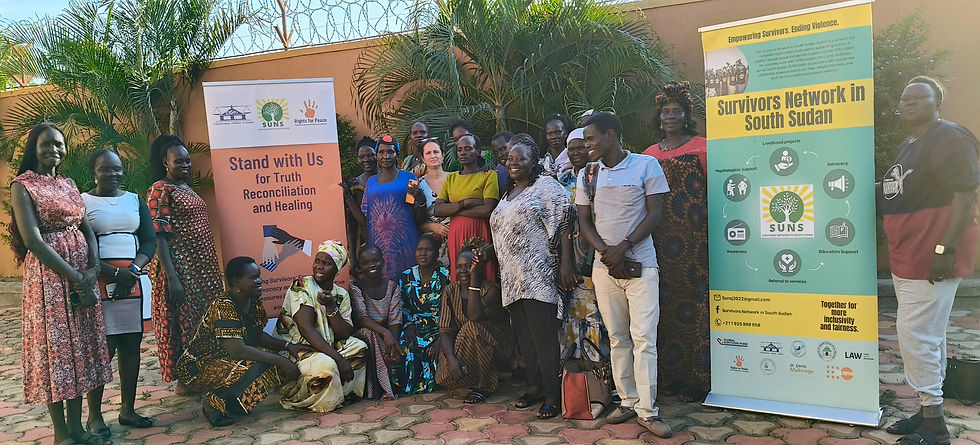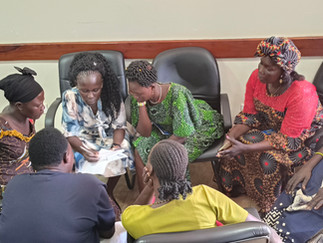Celebrating the UNSCR 1325 at 25: Women, Peace and Security in South Sudan
- Ella Cowell
- Oct 31, 2025
- 5 min read
Today marks 25 years since the United Nations Security Council adopted Resolution 1325: a commitment to increasing the number of women involved in decision-making in international peace and security.
UNSCR 1325 (2000) on Women, Peace and Security (WPS) established a global agenda which, for the first time, highlighted the gendered nature of conflict and the importance of female participation in peace processes worldwide.
How is conflict affecting women and girls in South Sudan?
The conflict that broke out in 2013 in South Sudan has had a gendered and uneven impact for women and girls:
"Women and girls have borne the brunt of the worst forms of sexual violence, discrimination and marginalisation", said the UN Commission on Human Rights in Sudan.
In November 2024, two Transitional Justice (TJ) mechanisms designed to bring peace, justice, accountability and compensation to those affected by human rights violations in the conflicts were signed into law: the Commission for Truth, Reconciliation and Healing Act (CTRH) and the Compensation and Reparation Authority Act (CRA).
So, how have women and girls been engaging with these TJ mechanisms in South Sudan? What more can be done so that the peace process is centred around survivors? And how can we continue to ensure that the voices of survivors are amplified in these processes? While progress has been made, there is more to be done so that women are represented at all levels of peace-building processes in South Sudan.
We can consider progress through the lens of three key clauses in UNSCR 1325:
"1. Urges Member States to ensure increased representation of women at all decision-making levels in national, regional and international institutions and mechanisms for the prevention, management, and resolution of conflict"
South Sudan is the only country in the world to have enshrined a gender quota in a 2024 peace agreement, compared to the 35 other peace agreements made in that year. The Tumaini Initiative followed the same mandate set out in the 2018 Revitalised Agreement on the Resolution of the Conflict in the Republic of South Sudan (R-ARCSS): that 35% of the Executive should be women (Article 1.4.4), and that the same proportion of female representation should be seen in South Sudan's three TJ mechanisms (Article 5.1.1).
But while this commitment is a significant accomplishment, why is this minimum level of representation 35%, rather than 50%? It is important that women are represented meaningfully in peace-building, not just in relation to a quota, but because the gendered nature of conflict means that without female leadership, the peace process cannot be gender or survivor-centred.
Rights for Peace (RfP) strongly advocates a survivor-centred approach to the TJ processes currently underway in South Sudan. RfP is collaborating with the Centre for Inclusive Governance, Peace and Justice (CIGPJ) and the Survivors Network in South Sudan (SUNS), with the support of the Global Survivors Fund, to elevate survivors’ voices in peace-building. At an RfP-led event in June 2022, SUNS, and its members met with parliamentarians and ministers in Juba, presenting them with the first ‘parliamentary briefing’ of its kind.
Following their statements and briefings on the TJ laws, in September 2024, SUNS members attended Parliament to campaign for a survivor-sensitive process. This led to the inclusion of a representative from a victims’ advocacy group on the Selection Panel for the CTRH Commissioners.
In July 2025, over 15 female survivors of Conflict-Related Sexual Violence (CRSV) attended a National Level Advocacy workshop, which empowered women to talk about the challenges they, and their children born of CRSV, face. Survivors shared their experiences and created a statement expressing their views, including that “survivors must be represented in the transitional justice institutions”: this has not yet occurred. Across all of these events, the amplification of survivors’ voices has increased the representation of women in South Sudan’s TJ process. But amid continuing violence, there is more to be done.

"10. Calls on all parties to armed conflict to take special measures to protect women and girls from gender-based violence, particularly rape and other forms of sexual abuse, and all other forms of violence in situations of armed conflict"
Women and girls are disproportionately affected by sexual and gender-based violence (SGBV) in conflict. Between April and June 2025, 65 incidents of SGBV and 30 incidents of CRSV were recorded by the Human Rights Division of the United Nations Mission in South Sudan (UNMISS HRD) across South Sudan. Women and girls accounted for 100% of the documented victims. Female participation is essential to ensure that holistic and survivor-centred responses are integral to peace-building efforts.
Protection is one of the four key pillars of the WPS Agenda. However, SUNS has reported that survivors are “living in fear”. Current protection measures are inadequate in enabling survivors to feel safe, let alone to testify. As such, participation in the TJ process risks being limited. This not only prevents justice from being achieved for survivors but also diminishes the participation of women in the peace process.
Rights for Peace is holding a National Level Advocacy Workshop and Event in November 2025 to address the issue of protection for survivors and amplify their voices in the TJ process. This will continue to sensitise survivors of CRSV to the laws which have been created to bring them peace and accountability, and how they can shape them, given their experiences of the conflict.

"11. Emphasises the responsibility of all States to put an end to impunity and to prosecute those responsible for genocide, crimes against humanity, and war crimes, including sexual and other violence against women and girls"
In South Sudan, accountability for conflict-related sexual violence is marred by barriers. There are few trained female police, investigators or judges, resulting in disproportionately low numbers of investigations, prosecutions and convictions for sexual violence crimes. The most accessible avenue to address sexual violence is through customary justice mechanisms, given the advantages in terms of distance and language in a country where over 50 languages are spoken. However, traditional justice mechanisms have tended to be “male-dominated spaces” in which “women are not represented and the issues are settled by men,” though this may be changing.
Patriarchal norms have contributed to a culture of impunity for SGBV in South Sudan. For example, at a Military Court Martial in Yei during June 2022, victims were not separated from perpetrators during trial, which itself took place in a military barracks, with all of the perpetrators themselves being military personnel.
Despite the challenges, there has been significant progress on prosecutions for SGBV. The first Gender-based Violence and Juvenile Court in the country was set up in 2020. In parallel the Judiciary with support from UNMISS has been deploying Mobile Courts, first in Leer (Unity State), as well as in Maban (launched in October 2025), with another recently concluding in Benti- having decided six cases of SGBV, two of which resulted in convictions. These localised court proceedings are dispensing justice to multiple regions of South Sudan, increasing the availability of prosecutions to CRSV survivors nationwide.
The establishment of a Hybrid Court for South Sudan (HCSS), in line with the 2018 Peace Agreement, mandated to prosecute international crimes of genocide, war crimes and crimes against humanity, has faltered so far. There is hope that the HCSS will eventually emerge to put an end to impunity and prosecute those responsible for CRSV amongst others.










Comments